|
Namaskar. There are three basic paths of yoga. One is bhakti, devotion. The other, karma, good work in the world with a sense of selfless service with doing things without attachment to the results of actions. And the third path is jnana yoga, the yoga of knowledge. It works with the mind. Bhakti works with the heart, opening the heart, and the feelings of the divine experience. Jnana works with the mind, restructuring the mind so that conditioned thoughts, attitudes, and ways of responding are let go. And karma works with being in the world and relating to other people, relating to service in the world, Seva. So these three paths, each have significant advantages, and when they are combined together they form a powerful structure that can integrate both mental development, development in the feelings and relationship to the infinite, and development in your daily life in your service attitude and work with others. When combined the three form a reinforcing system that can make real change, transformative change. But many times it is too much for someone to begin with all three and so one may begin only working with the mind, the attitudes and beliefs, deconstructing erroneous beliefs and gaining new insights and understandings, dissolving the conditioned mind. Or one may begin working with the heart, establishing a relationship to God, establishing a fundamental experiential feeling related to the Infinite. Developing love for the divine and through that feeling of love and devotion there comes great humility, great passion. When that detached understanding comes in action and you realize that the cosmic one is everywhere, both receiving and doing actions, then the results of actions do not stay with the ego because they are not done by the ego self, and the ego self does not feel attachment to the results. Then, when that happens this karma yoga wipes away the delusions of the mind, wipes away the samskaras, all of the attachments to the reactions of one's actions, and begins to free psychic space where there is no action no reaction of mind. When this overall science of yoga is applied, two phenomena develop in a person that brings them to the truth. One is that they develop vairagya and the other Viveka. Vairagya means detachment, true detachment, not the renunciation of an idea, not the renunciation of the belief that you will renounce the world, but true detachment.
When you begin to see that the Infinite is everywhere, God is everywhere, and only by the grace of that great divinity does any action come. When you begin to see there is no separate self to do anything, that everything, every molecule of you is made of that divine Beloved, the separation of I and Thou dissolve. True detachment comes because you realize that who you are, who you have been, are the same. It’s the same. And the feeling of attachment to the results of your actions begins to diminish. And this is true renunciation. Renouncing the attachment to the results of your actions. And thus, gaining a clear mind, clear vision, clear understanding of the nature of the God Self, and when that clarity is there, that discrimination, you become able to know the unreal from the real. You understand the deep nature of reality and you can discriminate knowing what is truth, what is truly real. This is a great power that comes from dissolving the conditioned mind, awakening the heart, and doing actions in the world with a detachment to the results of your actions. Thus, vairagya, renunciation, trie renunciation, and Viveka, true deep discrimination, the ability to know truth, to know the real from the unreal, come as a result of these yogas. And the Yamas and the Niyamas become doable, really doable as you follow these yogas. The Yamas and the Niyamas form the base for your action in the world. Action-based in love and loving-kindness without violence to other beings. Actions based on truth and deep honesty with self. Without coveting what someone else has, and without trying to secure yourself by accumulating more and more, you are able to live in the world with truth and kindness, and love. And thus you gain the power of a pure mind, pure thoughts, a pure heart, the simple childlike nature, and you gain the ability to be truly content with who you are, what you are, and with what life is. You become content. Santosha is achieved. And tapas, the ability to love selflessly, to have true loving-kindness comes, and the ability to know the truth, to understand the deep nature of your own self. This development of knowledge comes when you practice all of this. And finally the realization, the dissolution into the divine God Self. This is the culminating realization of the Yamas and the Niyamas and of the three yogas, the three primary yogas – bhakti, karma, and jnana. Without coveting what someone else has, and without trying to secure yourself by accumulating more and more, you are able to live in the world with truth and kindness, and love. And thus you gain the power of a pure mind, pure thoughts, a pure heart, the simple childlike nature, and you gain the ability to be truly content with who you are, what you are, and with what life is. You become content. Santosha is achieved. And tapas, the ability to love selflessly, to have true loving-kindness comes, and the ability to know the truth, to understand the deep nature of your own self. This development of knowledge comes when you practice all of this. And finally the realization, the dissolution into the divine God Self. This is the culminating realization of the Yamas and the Niyamas and of the three yogas, the three primary yogas – bhakti, karma, and jnana.
0 Comments
 When there are many difficulties in the world and the normal routine of life is disturbed by them, it creates certain stress in the mind. And, with the current situation with fires, plagues, and political strife of an unknown unexperienced previous nature, there is tension in the air and little things become big. Sometimes situations that you could easily handle become very stressful. And you find when you calm yourself to meditate, there is certainly stress within from the stress and strain of the time and the lack of social interaction and opportunities to express yourself in the world. Self Care This is the situation that all are facing right now, and depending upon your circumstances it may be better or worse. Surely, everyone around you is having problems or tensions to one degree or another due to this external upheaval and difficulty. In times like these, it is important to take regular breaks from your work, computers, and from your activities in life to simply calm your nervous system. Do your sadhana, let your nerves relax - this combined with physical exercise to the best of your capacity given the circumstance. Get out into nature if you can but even walking around your house or block is fine, just get some exercise every day. Also, two, three, four times a day take 5 to 20, 30 minutes to just calm your nervous system, to get away from technology, do a few stretches, and then sit, breathe, connect with your Divine Source and let yourself move into alignment and harmony with that universal source. Because, when you do this you will find the strength, the solidity, the healing that is not represented in your external circumstances at the moment. External circumstances come and go and patience is needed when you go through difficult times. There have been very difficult times in the world so you are not alone in this experience. There are those who survive. They make it through the most difficult times because they find inside of themselves a resilience, a place where they can nurture their own being and find their solid ground. 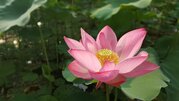 Sadhana When you do sadhana, when you calm your breathing, when you bring divine grace and love into your psyche, into your energy field, then you bring in healing from the deeper source than these external circumstances. External circumstances are variable but that inner base of your being, that is a resource that is sustainable, that doesn't change with the passage of time or the circumstances outside. Get away from those things that you are doing and the worries of your life and just drop into that divinity within you. Let that love permeate you. Let that grace be around you. And that will make a difference. You will notice that you begin to be more solid, more able to weather the difficulties of life. And when you hear one more bad news it is less likely to distress you and you are more likely to find your peace and your harmony, and more likely to be able to deal with external circumstances with a more even hand and to maintain your own emotional well-being. Recommendations So, the exercise is, do a little socialization as you can do safely, and the meditation practice three, four times a day of deep attunement. This will help you to weather these times. Phone calls to friends, your zoom conferences, whatever it is that you feel more comfortable, but don't forget these times of silence and of physical activities. Those two are very important to your psycho-physical balance 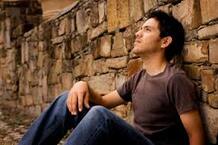 Namaskar. Many different feelings and emotions come in human life, many different types of experiences. And some of them are very painful, very difficult. Difficult experiences can be unique to you, or you can be part of a collective Karma, where those experiences involve a whole group of people. Regardless of your experiences in your individual patterns or in the collective pattern of the society or in a sub-society, when times get difficult, there are losses, there’s grief, sorrow, anger. All of those emotions arise because of your engagement with the external world, with the environment around you—whether it be a marriage that has gone bad, a child, a parent that you struggle with, a job, friendships. There are many different places that struggle can occur. Or whether it be the collective society and the norms of the society and how they promote injustice, indifference... Can you imagine to have a family member dear to you shot—how you would feel? How many people have suffered? And yet despite their suffering, they have had nothing but injustice for years upon years. Such things happen in human life. They happen individually and they happen en masse—whole communities wiped out in wars. Human beings have an exceptional ability to be cruel to each other: a shadow of human experience that needs to be recognized and addressed, and addressed inside yourself, observing in yourself that shadow which can be cruel; which can be angry; which can be resentful, revengeful; which can be bitter, and want to aggress against others. Observe that part of your own human nature, because it is a part of human nature, a part of the human experience. But there is another part of the human experience: the desire to care for others, to be of service to the world, to love living beings, and to try to figure out how to love them genuinely and sincerely without hypocrisy, without secret motives. This is the challenge of human life, and it is the challenge to follow the path of Dharma toward the deepest love of human experience, towards the one eternal soul, the Self of all beings. It is a journey of learning how to love. The journey of spirit is one of learning how to love and how to let go, how to surrender to the will of the infinite, be it painful or joyous. Today the winds may favor you; tomorrow they may go against you. But can you ride these winds of the world in peace within yourself? Can you find that peace which is lasting, which can surround you and permeate you, and even though life goes high and low, you remain even in that peace deep inside of yourself? Yes, when dealing with the world, you go up and down with the world around you. But you can find that deep peace within you, and that can be a solid rock in the storms of life, a place of calm, a place of love. For peace and love go together. When love is deep, compassionate, and unconditional, it brings peace in the mind. It brings contentment. For the deep love doesn’t vary, doesn’t want anything. It just is: a great compassion that just is. That is the nature of grace, that great compassion that is a shower of infinite love, healing, a healing balm on a troubled heart, a settlement of wounds from the world. That love is something that can permeate you, and not only permeate you, it can flow through you into the world. So that you feel that unconditional love, that shower of grace, that infinite compassion, and it flows through you and into the world of form. Can you allow yourself to open to that grace, to that love which is so compassionate, so unconditional, and let yourself melt into it, melt back into it? 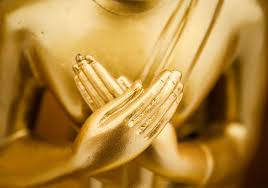 Let go, let go of everything you’ve been holding on to, of all the beliefs about yourself, all your beliefs. Let go and let yourself feel God’s presence; feel that love that the divine has for you and for all beings, and let it flow through you, permeating you, permeating every cell of your body. Let it flow through you into the world, to those around you. Be a hollow bamboo through which the love of the universal one flows into the world. This is the great potentiality of human life. You have a choice, a choice that you make every moment of your life. You have a choice to follow the lower emotions, the wounds which have hurt you, the injustices; to follow the anger, the resentment, the bitterness, the greed, the fear. You can follow those, or you can witness them as part of your humanity, but choose not to follow them in your life, and instead place yourself in this flow of unconditional love, in the shower of grace, shower of love, shower of light. And let yourself fall back into it, dissolve into it, and let it flow through you and give you the knowledge in every moment of the right action in that moment, the kind action. Because when you align yourself with Dharma, when you align yourself with the love of the infinite and the shower of grace, then that comes through you. You begin to mirror that which you associate yourself with, and you melt back, you have more and more parallelism with that divine existence, and then it begins to express through you. And you become a vessel of Dharma. Then, you can really follow Dharma. If you try to follow Dharma from your intellect and your ideas and your beliefs, it will not work. It is not enough. Dharma has to be followed from your heart. Dharma lies with the great. So when you align yourself with the great, Dharma flows through you. Love flows through you. Then service is naturally there. So you make choices every moment of your life. So be conscious, be aware of these choices, and choose to align yourself with that one eternal divine being that is the core of your own nature and the core nature of all beings. That divine being, Parama Purusha, has only one intent, to draw all living beings home into this ocean of love, ocean of truth, ocean of being, in the peace and stillness of absolute love. When you align yourself with the intentions of that one, and you become a vessel for that grace, then you are truly a Dharmika, one who follows Dharma, and a gift to the world. 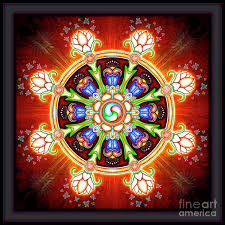 Dharma needs to be followed both by individuals and by the collective society as a whole. When an individual is out of alignment with dharma, their life becomes disjointed and they cease to have a harmony with the world around them. They become self-centered and self-absorbed. When a society, a nation, state, social or religious group, is out of alignment with dharma, the society begins to fragment and lose its balance. Prama, the cosmic principle maintaining a stable balance in the universe, is lost. Prama is very significant in understanding dharma and living harmony. It refers to the basic balance maintained in the interwoven web of life, the harmony that makes the universe work as a whole. All beings obey the rhythm of nature’s flow and, in doing so, are in a smooth and blissful relationship to life. People can live in complete composure, unhindered joy and happiness when life is in balance and prama is present. However, this situation of blissful harmony changes with the emergence of desires such as greed, domination, and power, which create a civilization out of alignment with its surrounding world. It also changes in a person’s life when they lose this delicate balance and prama evades them. The collective spirit of a people awakens when fed by the whole of the society. Society needs to support the development of the people within it. If not, it becomes a hindrance to its citizens and members, imposing social structures and norms that impede a person from being able to realize their own personal dharma and feel happiness and success in life. People suffer when their basic needs for food, clothing and shelter, as well as their needs for access to expansive thinking, devotion, and a way to find mysticism in their lives are not met. The heavy hand of oppression weighs down on people under these circumstances. 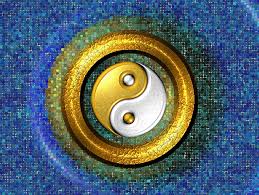 The materialism of today is the result of the age of the merchant societies, the Vaishya age, coming to a close. The emphasis upon material well-being and material wealth has, in many parts of the world, become so dominant that people absorbed in this material life lose their spiritual hearts. The materialistic society fosters an attitude of dominance over nature, abusing and mistreating animals and disturbing the balance of life upon the planet. As a result, devastation occurs. Chaos results when dharma has been forsaken and prama is lost. The natural laws that bring harmony to the planet and to all the species of living beings are being violated, and thus the ecological systems and natural order of the world are disrupted. The result is loss of many species, loss of environmental stability and changes in weather patterns. Nature, out of balance, becomes wild, destructive. People have formed societies with the attitude of a conqueror, rather than in harmony with the planet and its natural laws, and those societies are now threatened. The atrocities done to living beings upon the planet in the name of progress have an impact. As the planet moves from order to disorder, from harmony to chaos, the forces unleashed are powerful, and they will reorder the world until harmony is regained and dharma restored. All comments are welcomed. Feel free to browse our store and discover new books, yoga supplies and more. As this pandemic has unfolded around us, perhaps you have felt afraid at times, or at least concerned. You have probably had to reshuffle your life in some ways that are good or difficult, or both. Maybe you have put yourself down for getting worried or tried not to think about things that are scary.
As I have been contemplating my own feelings in this situation, I have come to think that both fear and love have a place. If a mac truck is barreling down on you, you get a surge of fear and jump out of the way. The body reacts to protect itself automatically. This pandemic seems to me to be a kind of mac truck that our bodies react to trying to protect us. If fear makes you wash your hands and saves your life, it has its place.
Let us pray for those who are suffering at this time and offer their welfare to the shelter of the Lord of Love, the Divine Mother, the Infinite presence. Om shanti, shanti, shanti. With love Maetreyii Ma 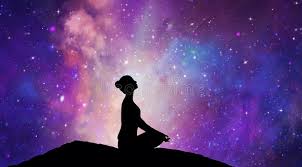 The situation in the world today is one of shift and change. The more dynamic the change, the more resistance to change occurs. Change that brings transformation is not easy. That which has existed, the status quo, wants to continue to exist. This is true in personal life and in collective life. So, in a true transformation, be it personal or social, involving many people, there is always the dissolution of what has been, in order for the new paradigm, the new level of functioning to exist, and so, this old level of functioning, this old way of being does not simply perish without resistance. There is always resistance—in you—to change; and in the collective of people, there is resistance to change. Change is frightening. It is the unknown coming to exist. And people want to avoid that fear: the uncertainty of something new, something they haven’t experienced before. They want to return to what is safe, what is known. And, so, many times there is a reversion before there is a transformation. And in the world today you see many countries, many people attempting to hold on to their heritage, hold on to their local identity, hold on to their—to what they consider to be their days of greatness for their society. There is backward-looking psychology that wants to find some glory in the past that is safe. But naturally, the past is gone and can never be replicated. What was, will not be again; but what will be even more dynamic, more fulfilling. But the path there may be perilous. You notice the great reaction to the so-called world government. People want their national autonomy. People want their racial autonomy. People want them—want to return to the way it was. And so there is a great wave of conservatism in the world today. Many people hope that in this they can find shelter from impending change, which they sense, but they cannot define. As there’s more and more talk about the impact of climate change, pandemics, situations that affect the global community. Rather than jump to global solutions, many people want to find shelter in ideas and beliefs that no longer serve. They were meant for a society with a much smaller population, where there was no international travel and cell phones, and people were not so interwoven and interconnected. In today’s society, what affects one country will affect everyone, economically, health-wise. 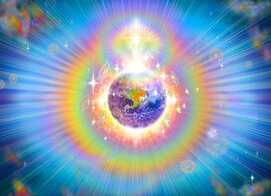 The world is like a spaceship. It is one, one home, and we have gone far beyond the point of being able to return to our small and isolated societies that have relatively little impact on the globe. Now, we have the capacity to destroy ourselves in multiple directions, and the population of human beings is very large. Nature will right herself. And these are not easy times that lay ahead. It’s a time when people—various assaults will come because of the imbalance in the world, because Dharma, which brings harmony and peace between all beings is not fully established. It is lost, the Prema; the balance in society has been disturbed. The balance of the world has been disturbed. The balance of the planet has been disturbed. And so, nature will right herself, and balance will return. In these times, what a person can do is the real question. What can you do personally, individually, to protect yourself and your family, to survive these times, and to help the society at large? I have said many times recently, it is not the time to bury your head in the sand because soon the sand will be swept away from under you. This is not the solution. It is time to wake up and to take action. Both for your own well-being and those around you, and for the collective of humanity. This is a time to act. What you can do to support those who would support the ideas that help to ease the burden of this change, that help to ease the pain and suffering that will occur in this time of transition—those are the individuals who must be brought to power. It will happen, sooner or later. The desire to return to the golden days in the memory of people—that psychology which thinks that solutions of the past will work in the present—that will fade as the situations become direr and people demand attention and solution to the existing problems of the day. So, to help promote the change,the addressing of the changes as early as possible, those actions will be beneficial. And for each personally, as various threats come, whether it be the threats of illnesses that spread across the globe; the threats of storms and fires, and floods; or the threats of political reactions causing extreme hardships—in all of this, maintaining your Sadhana, maintaining your balance when people are in fear, not giving way to fear, but recognizing that the divine Brahma is in all things and that life itself is transitory. Whether that transitory nature is shown in one way or another, all societies that have existed in the past have faded away. Change is a part of life. And great transitions require great changes. This is a positive transition in the end. But the time of deconstruction of what has been and the building and reconstruction of what will be is a difficult time for humanity. Transformation is not easy. Having your spiritual base, finding your balance, mental balance there; doing work in the world that brings Dharma and as much harmony as possible… No one is immune to these changes, so, to try to hide from these changes, find your safe little corner—it really won’t work. Everyone is on the front line of some of these changes. Even if you are the most powerful king or president or queen, you are not immune to diseases. Even if you are the most powerful person, you will not be immune to the changes on the planet. They affect everyone, poor and rich. Though those with fewer resources may have less ability to cope with them, in the end, everyone is fully impacted. So, be practical, be logical, do what you need to provide practical resources for yourself in potential times of difficulty, and work for Dharma, and try to give people spiritual calm and peace, spiritual understanding, in a time of great transition. Practical steps and action are what is required during these times. As for whether this particular virus that hit the world so concerning will spread wide and far and how many will be lost to it, that is yet to be determined by the actions of human beings. If human beings take significant action, it can change the situation. If human beings take no action, then the situation will be different. The same is true for the climate. Remember to check out Dharma for Awakening and Social Change to find out how you can personally have an affect on supporting the changes we would all like to see in our world. 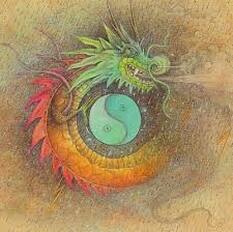 The teachings of the Tao come from the ancient teachings of dharma. When a being follows the Tao, they are in alignment with their inherent nature and they follow the laws that govern that inherent nature. These laws, the principles and operating forces of the universe, are the fabric of existence. Without them, the natural world would lose its integrity. To understand the Tao is to understand the inherent nature of human beings, the inherent nature of rocks, the inherent nature of water, the inherent nature of Earth, and the inherent nature of each and every type of living being. When beings are in alignment with their inherent nature, dharma flows naturally. A sense of harmony with all life is the result. The Tao is the Way. Dharma is also called the Way, the law, the path. Dharma is inherent in all things. Human beings have a longing for the Great. There is a restlessness in the hearts of people because there is dissatisfaction with duality and feelings of separation from the whole. Sooner or later, most people experience the existential pain of separation from the unconditional love that is the source of their being. This separateness, and the restlessness that emerges because of it, brings a search for wholeness that may take many forms. People try to acquire things to feed the need inside of them. They grasp for solutions, not only in the physical world but in the psychic and spiritual worlds as well. However, this need to reconnect with wholeness is met only when dharma governs a person’s life and they move in harmony with their innermost Self. Bhagavat Dharma, our human dharma channels our restlessness towards the Great. When we do this, our unique human expression moves towards unity and wholeness. We align ourselves in perfect harmony with our inherent, natural state of being. Dharma is followed when you are in alignment with the natural laws of the universe, with the laws of the Divine Mother. When people find harmony with all that is, life becomes an expression of love, a Seva, a service to others. One feels alignment with the Tao. When you are in the flow of dharma towards the Divine, all that you have seen and known come into a harmonious alignment and become directed towards your innermost Self rather than towards pleasures or worldly acquisitions. When dharma governs your life, the little sense of “I” melts away and is surrendered to the love that is unconditional, that is the larger Self. The pain of duality is dissolved in Moksha, liberation from ignorance, a movement from ego-centered pleasure-seeking to selfless love in the flow of dharma. This movement towards unitary wholeness and liberation is the natural, essential flow of human life, inherent in your own being. 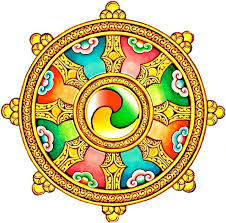 In order to truly follow dharma, four qualities need to be cultivated. They are Vistara, or the expansiveness of vision; Rasa, flow, to be saturated with blissful awareness and movement towards your eternal essence; Seva, service, and Tatsthiti, divine union, wholeness. If you are to follow dharma, you need to have a vision of what your Source looks like. A meditation practice on the nature of divinity is essential for this. It assists you to expand your mind beyond your limitations and beliefs, to have a willingness to look afresh and move beyond all of the stale constructs that you have built. If those constructs were true and promoted spiritual growth, then surely you would be enlightened by now. But the constructs in your mind, your beliefs and your opinions hold you back. They limit you by saying “I am this” or “I am that.” You confine yourself in a little box. “I am a teacher.” “I am a doctor.” “I have a certain prestige.” You confine and constrain yourself into very finite boxes. You box yourself in, so to speak. The call of your internal longing ever counters this tendency, saying to you “Look beyond the box,” “See outside the box.” “Think outside the box.” You are far more than the boxes you have made. Your truth comes from deep within, and its calling is dharma. Following this call is known as the way of dharma. So, to follow the way of dharma, you first need a sense of expanded awareness known as vistara. This is a widening of your inner sense of vision that comes from deep meditation and contact with your Divine source. “Ahh, I have felt the bliss so sweet, have beheld the unity of all beings. I have watched the sunset and felt love wash over me. I have seen the trees and smelled the freshness of the forest, felt that I am one with the forest, am one with all its little creatures. And I am one with my brothers and sisters and all the people of the world.” This is the experience of vistara. To follow dharma, you must not only have an expanded vision of the One, but also the passion to stay connected to essential being. This quality is called rasa. Rasa is the taste of a thing. It means to be saturated with awareness of Divine presence, to feel alive with the joy of Divine connection. 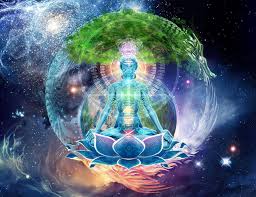 Dharma is not only your individual path to follow, but it is also a collective or universal path. It has enormous social implications. A society may move towards dharma or away from dharma. For dharma to be expressed within a society there must be expanded awareness, vistara, as well as dynamic flow towards Divine love and truth, rasa. People need the opportunity to perceive the interconnected wholeness of life and the love underlying all things. Then they can make all and every effort to move towards that beatitude. There is another quality that is also essential to the path of dharma and that is seva, actions in the world which reflect your expanded vision of the wholeness of life and your deeply felt connection to wholeness. Seva is service, but it is a special kind of service in which you serve all beings as manifestations of the One. Seeing God in all, you offer service to God in the form of living beings. And, in the offering of service, you realize that it is in fact the power of the infinite that provides the service through your form. This is seva. Once seva is enacted, the three components of expansion, blissful connected experience of the whole and service to livings beings are all in play. The result is tatsthiti or Divine union, the fulfillment of dharma. 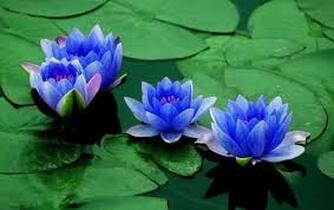 In spiritual life there are three important concepts that can further your spiritual development and make all the difference. The first concept is Dharma. Without Dharma, there is no spiritual life. Dharma is that movement towards the great, towards the divinity that underlies all existence. Without Dharma there is no spiritual life. So, Dharma is the movement towards the divinity. You may involve yourself with things of the world, but unless you move towards that enlightened state, towards that awakened knowledge, there is no true movement in life. And that movement, that process of moving towards that awakened state, that enlightenment, is Dharma. Those things that support that movement, they are part of Dharma. And each person has the universal Dharma, for it is the Dharma of human beings--Bhagavad Dharma—to move towards the great. It is our natural inclination. But every person also has their own personal Dharma, their Svadharma, their Dharma as a unique individual, their own personal way, their own personal journey. Each of you has this Dharma. So, when you align yourself both with the universal Dharma of human beings and with your own unique Dharma, and you move your life towards your divine goal, then that alignment with Dharma moves you from your ego-centered understanding of the world to the divine, cosmic existence. So, understanding and following Dharma is the first, very significant tool that you have for spiritual life. The second tool you have for spiritual life is Sangha. Without Sangha, there is no—there is difficulty to follow the spiritual path for many people. Because you are often influenced by the forces around you, the people around you. And if those forces, those people do not support your following Dharma, it becomes very difficult to follow Dharma. So, some place in your life you need Sangha; you need the company of like-minded people who support you in your journey towards divinity. So, Dharma and Sangha are the first two great tools that you have for spiritual life. And the third tool that you have for spiritual life that is most significant is awareness of that enlightened state, the enlightened one—that you might come to know that enlightened state by association with those that already have an experience of this, that you come in the contact of saints and sages, that you read the writings of saints and sages, that you hear talks, that you contemplate words of truth, understanding. From this you can bring deeper understanding to the mind, that you understand your pathway, you understand what you are doing and where you are going. But more importantly, as the teachings sink into you, you begin to feel the way. You begin to know deep in your being the light of the inner truth. So, following and knowing the teachings is the third great gift you have in spiritual life. 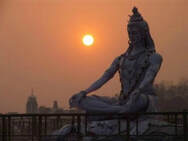 The Dharma, the Sangha, and the way of the masters, the teachings of the masters, these three tools are your great gifts given to you on your spiritual path. And following them will greatly enhance your journey and bring you to the realms of truth, to the shores of love, to the light within you, the radiant existence that transcends your individuality, transcends your sense of self and other, so that in that light there is only the love, only the truth of the inner-born Self. There is only the love which has always existed, will always exist. In that light, in that truth, you are not an individual. You are part of that radiant existence. When you surrender to that love, to that presence, that all-compassionate presence, the divine existence, it is something vast, intelligent, radiant beyond words that cannot be defined or confined by ideas in the human mind. Rather, the mind can let go, and the heart can feel, and in that feeling dissolve the sense of duality, the sense of separation into this wholeness of light, the wholeness of love, the wholeness of being, so that there exists not two, but one. One truth, one love, one essential being.  For most people, when the group goes one way, they go that way; they believe what the group believes. When the group goes another way, they go that way. Why? Because they have surrendered to the group psychology, as their instincts around power and submission tell them to do for their survival. Human beings are not so strong; have compassion for them. Just as the wolf has an instinctual response within its society or the deer with its herd, or the horses, or the birds, so human beings are equally bound in their reactions. People in general have a profound mental pride that they do not see their responses to their own societies. They do not see how they are giving away their ability to make personal choices to the groups they identify with. Instinctual survival and group behaviors are in the genes but for the true yogi who has a personal association with God, in the process of meditation, as the higher layers of mind open, these genes lose their influence. As one grows toward an enlightened state, the genes that create these instincts and the survival needs that drive behaviors of dominance become less and less active and eventually turn off. Then love for the Supreme dominates. The yogi who wants to know truth must step apart from this biology, from the dominance of the body and the way the body structures the mind. To do this, begin to witness your own existence. As higher layers of the mind become accessible, the calm witness, knowledge and detachment from the animal instincts grows. Instincts are driven by fear and all that happens as a result of them is based in fear. The closer you are to the Divine, the more the instincts of survival turn off and the fear that drives them dissolves.  All those who teach about this problem give the same advice: Avoid group identification. Feel that the whole universe is your home; all living beings your children, your family. Stand apart from any side and take actions of loving kindness and compassion. Seeing the pain and the shortcomings of all people in this world, have compassion for the humanity, the difficulty, the struggle, the pain. Bring healing to humanity; approach all with compassion and love. If you want this change, follow Yama and Niyama, rather than the dynamics of power and look very closely at your own self. Find your own relationship with the eternal Self and with all beings. You can only do this as an individual. The sangha (spiritual community) can help to a degree but it is important to have your eyes open when relating to a group to bring your internal locus of surrender where you give your power freely to the God within. The true spiritual seeker turns within to the Divine and seeks guidance from that one and not any external force. Standards of morality need to come from your relationship to the Divine. Then there is a certain detachment from all groups and all group-isms. To avoid group identity is much more difficult and involved than it appears but it is key to being able to follow Yama and Niyama. So have all the Masters taught. Essential morality does not lie within a group psychology. It lies within you as an individual and within your relationship to the God Self. And that relationship is personal and singular. The true Sadvipra (developed spiritual person) is a part of all groups and a part of none. Being a person who stands for dharma, he or she lives by ethics, for the love of the Divine. Actions are governed by personal experience and by what has been revealed from the innermost being. |
Author
|
Categories
All
Dharma
Forgiveness
Intro To Yama & Niyama
Living In Harmony
Niyamas
Spiritual Activism
Spiritual Awakening
The Nature Of Love
What Are The Niyamas
What Are The Yamas & Niyamas
What Is Gratitude?
Yamas
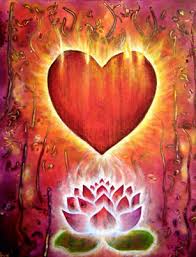
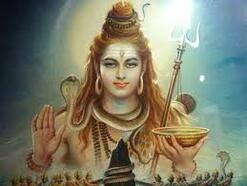
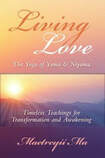
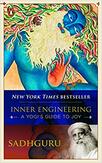

 RSS Feed
RSS Feed